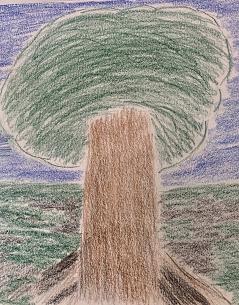A Deep Dive on Auras
More than 20 minutes into it — with my nose fully fragrant and recess over — it hit me. I hadn’t gotten flashing lights in two months. The dizziness was my new aura.
An aura is a warning that a tonic-clonic seizure may be coming. It’s a seizure in its own right, where you don’t lose awareness. But I never knew that. I mean, do people know that? As a young girl with epilepsy, I learned that auras were “warnings.” And that’s how I understood them, even into adulthood.
Not everyone with epilepsy gets auras. It depends on the type of epilepsy you have. For people diagnosed with tonic-clonic seizures auras can be part of the package. The two often go hand in hand. Like hopscotch and hide and seek, auras were just another aspect of youth. I don’t remember them in my youngest days. They muscled their way in, to my life or my memory, somewhere around fourth grade.
An aura can manifest in any number of ways — as a metallic taste, an odd feeling, or a visual disturbance. My auras always looked like flashing lights, and that’s what I called them. Growing up, I got “flashing lights” most from playing catch, playing tennis in the heat of summer, or when insects hovered in front of my eyes.
As regularly as I got them, auras never deterred me from playing. I took them as a sign to rest, always failing to understand, in my blessed little life, the danger they posed. I’d cool off in the shade of a towering oak and watch the ants conquer blades of grass for a while. Fifteen minutes later, I’d be back in the game.
Just because you get an aura doesn’t mean you’ll have a tonic-clonic seizure. You have to wait and see. The uncertainty gives the aura its power. It wasn’t until age 13, when I had a seizure playing kickball, that I understood what a seizure felt like and the role an aura plays in its progression.
Until then, the only tonic-clonic seizures I’d had occurred when I was too young to remember them. Despite the fact that my seizures were so well-controlled, I learned early in life to fear them. And I did fear them, without understanding why. In this way, epilepsy became the great ghost of my childhood. I absorbed its impacts as subtly as a whisper, carrying on with life as freely as I dared. It was an incredible gift, that oblivion — the miracle of medicine.
The seizure at 13 educated me and heightened my fear. After that, I’d see the kaleidoscope of orange, yellow and blue and brace myself for what came next, even if nothing happened. To someone with epilepsy, an aura’s sudden arrival can feel like an assault. I responded to the spontaneous bursts of color as I would to an intruder. When I saw the shimmering rainbow, so familiar in its pattern of hues, I froze. An eerie stillness descended as I realized this thing is happening, whether I’m ready for it or not. So I got ready for it, real quick.
When I started taking Lamictal in 1996, I began getting lights in my eye once a month. Never before had I gotten auras so routinely, and it didn’t take long to realize they were linked to my cycle. They always occurred three days before my period.
It stayed this way, month after month, for eight years. Until April 2004, when everything changed. Like fugitives fleeing in the dark of night, the lights were gone. In their place were the dizzy spells. To anyone looking in from the outside, the dizzy spells would have seemed so much worse than the lights. They were paralyzing, frightening beyond compare. The lights lasted 30 seconds, the spells stayed for 30 minutes.
And yet.
Why now? The episode by Lake Michigan happened one month after my 33rd birthday, as if my chemistry had changed just by blowing out the candles. It seemed ludicrous to think that a single birthday could impact anything. I couldn’t ignore the notion that age could be a factor, but what could be special about 33?
So shocking was this new normal, I couldn’t make sense of it. Until, with my nose full of lilacs, recess ended that day. In the stillness, I was granted a moment of clarity in which I saw everything. My aura had changed, and it validated what I had sensed all along.
Epilepsy was clearing my system.
The thought seemed all-too-optimistic for someone who had lived with epilepsy for 31 years. Still, I dared to believe it, because instinct never lies. At high noon on a sunny May day, epilepsy was rising up to say goodbye. In the depths of my being, I felt it.
With the dizziness over, I clutched the comforter to my chin and wrapped myself in the energy of a higher power. Maybe it was the way the sun beamed in just right or the soft chirping of the birds outside my window, but the moment cast a divine spell that extended far beyond the realm of my mortal self.
God was there.
I sensed I was traveling to a place I’d never been. To a land where dreams come true. All I had to do was hold on.



